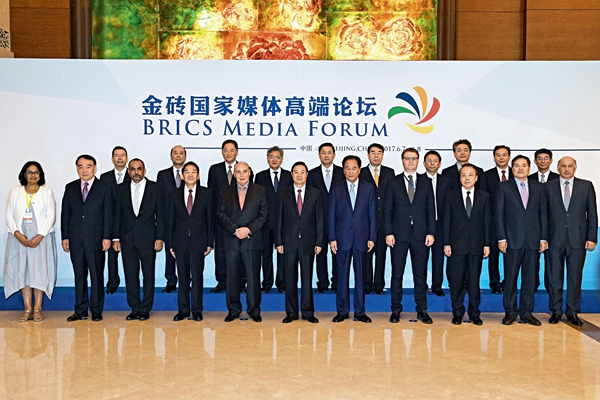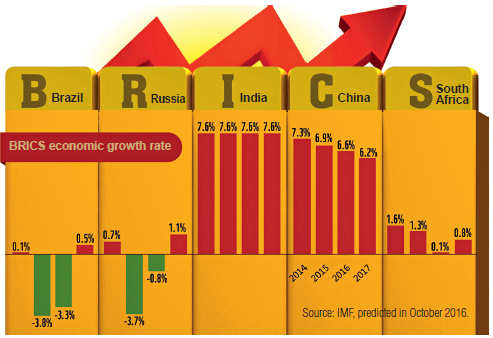A golden decade: BRICS cooperation achievements and experience
- By Wang Lei
 0 Comment(s)
0 Comment(s) Print
Print E-mail China Today, September 14, 2017
E-mail China Today, September 14, 2017
 |
|
BRICS Media Forum is held in Beijing on June 8, 2017. [File photo] |
During the 61st session of the United Nations General Assembly in 2006, the foreign ministers of China, Brazil, Russia and India held a meeting to unveil the BRICS cooperation mechanism. After 10 years of international vicissitudes, BRICS has developed into a brand-new power promoting the constructive reform of global governance; and its main representatives have defended the interests of emerging market economies and developing countries, creating a golden decade.
Fruitful achievements
After 10 years of development, the BRICS nations have achieved plentiful and substantial results in promoting global governance, pragmatic cooperation, people-to-people exchanges, as well as mechanism building.
BRICS nations have constantly driven the reform and innovation of the global political and economic governance systems, and helped steer them in a fairer, more rational and more efficient development direction. By means of mechanisms like meetings on security issues, counter-terrorism, and Internet security, the BRICS nations regularly exchange views, coordinate positions and make joint statements on major international and regional issues of common concern. BRICS firmly adheres to multilateralism, and has enhanced communication and coordination under major international bodies and cooperation frameworks, as well as contributing to building an open world economy and perfecting global economic governance.
During their 10 years of cooperation, BRICS countries have complied with historical trends, and constantly enhanced the representativeness and right to speak of emerging market economies and developing countries in international affairs. Mapping out a new blueprint, BRICS countries have become a significant constructive force in instilling increased democracy in international relations, propelling international economic globalization and promoting cultural diversity.
Pragmatic economic and trade cooperation has laid a foundation for BRICS cooperation. With rich experience in economy and trade, finance, science and technology, transportation, energy and mining, BRICS countries formed a set of important guidelines – the Strategy for BRICS Economic Partnership. After 10 years of development, BRICS’s economic aggregate has increased its portion from 12 percent to 23 percent of the world economy, and their aggregate trade volume has increased from 11 percent to 16 percent of the world total. Its voting share in the World Bank rose to 13.24 percent, its International Monetary Fund (IMF) share climbed to 14.91 percent, and its contribution rate to world economic growth has now exceeded 50 percent.

Financial cooperation became a highlight of BRICS cooperation during its first decade. BRICS nations have successfully pushed for reforms to the Bretton Woods system, the World Bank and the IMF. More importantly, the New Development Bank is the first multilateral financing institution established by developing countries, supporting infrastructure construction and sustainable development in both BRICS nations and other emerging market economics and developing countries.
People-to-people exchanges and education cooperation have consolidated friendships among peoples, which is the foundation of BRICS cooperation. An agreement on cultural cooperation was signed in 2015, spawning a host of colorful cooperative cultural activities in art, sports, media, think tanks, and traditional medicine. Some athletic meetings, film festivals, and cultural festivals have been held in BRICS nations. For instance, five directors from each of the five BRICS nations produced five separate short films based on the theme “Where Has The Time Gone?” The five independent shorts were then compiled into a feature film, which premiered at the second BRICS Film Festival in Chengdu, China.
Believing that the future belongs to the younger generation, BRICS countries pay attention to adolescent exchange and education cooperation, and focus on cultivating innovative talent with international perspective. A number of colorful activities such as youth football tournaments and youth forums have been held.
Mechanism construction has developed at a steady pace, forming a multi-layer, wide-ranging and all-round cooperation pattern. Developed from scratch, the cooperative mechanism has upgraded from foreign minister meetings to leadership summits. A multi-layer framework of pragmatic cooperation has been established in dozens of fields, such as economy and trade, finance, industry and commerce, agriculture, education, healthcare, science and technology, culture, think tanks and twinned cities. This pragmatic cooperation has imposed great influence on the international community.
BRICS has also gradually explored new ways to build extensive partnerships. South Africa’s joining realized the first round of expansion, embodying the open and inclusive spirit of BRICS cooperation. Consistently committed to carrying out dialogues and cooperation with emerging markets and developing countries while expanding its circle of friends, BRICS works to solidify its friendships with these countries.
The BRICS plan for global governance
Based on a decade of successful cooperation, BRICS nations have accumulated in-depth and practical experience, forming unique BRICS spirits and BRICS solutions.
The two reasons for BRICS’ success in cooperation can be summarized as “seeking cooperation while maintaining peace” and “focusing on development.” As a result of this grouping of emerging market nations, BRICS cooperation is an effective exploration of building new relationships between major countries and improving international relations. BRICS nations are at the same development stage, undertaking common developmental tasks, and are confronted with similar developmental challenges. These countries communicate and exchange with each other on major political and economic issues and share their own experience on managing state affairs. Their successful experience has set a model for other developing countries to realize national rejuvenation and economic and social development.
During the 2014 BRICS Summit, Chinese President Xi Jinping described the BRICS spirit of openness, inclusiveness, cooperation and win-win results. It has gradually become a universal consensus among BRICS nations, and was also well received by other emerging markets and developing countries. This new strategic partnership follows the principle of equality. Based on coordination and communication as well as reaching consensus through consultation, the decision-making model of BRICS has become an example for emerging markets and developing countries to follow.
BRICS nations adhere to the principle of equality, negotiation, and pragmatic cooperation. The principle of equality is the foremost one. No matter the differences in economy, population and territory, all member states stick to consultation on the basis of equality, and fully respect and consider the interests of every member, which is a major difference between BRICS and the cooperative mechanisms of developed countries.
Different in national conditions, systems, culture and development patterns, BRICS nations have tried their best to effectively eliminate disagreements, exchange policies, reach agreements, enhance strategic mutual trust, and "speak with one voice."
The five BRICS nations have reached a consensus to move forward in "four constructions," namely, integrated markets, multi-tiered circulation networks, connectivity by land, air and sea, and greater cultural exchanges. They have also established partnerships for maintaining world peace, facilitating joint development, promoting multi-civilization, and improving global economic governance.
Standing at a crossroads in history, the BRICS countries will usher in a new decade of cooperation at the Xiamen Summit. They will continue to join hands to build a new pattern of relationships with major countries, perfect global governance, promote world economic gain, and create a significant platform for South-South cooperation with international influence.
Wang Lei is an associate professor at the School of Government, and director of the BRICS Cooperation Center at Beijing Normal University.






Go to Forum >>0 Comment(s)